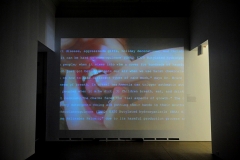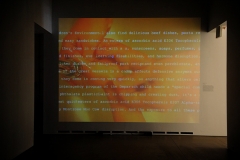Safe
video installation by beth hall, mark cooley & celia cooley | 2012
Maternalisms exhibition catalog by Natalie Loveless
The popular imagination is heavily invested in a deeply romanticized conception of the maternal. The laborious, messy and complex beauty of living with children is lost in countless sanitized and idealized images of a superficial, strictly gendered, privatized and heavily branded maternity. Popular culture gives a pre-packaged answer to the complex questions of parenting in a quickly changing world. For some, parenting is narrowed to a list of milestone purchases – graduating kids through a series of child development books, baby seats, bicycles, cell-phones, computers, cars, and so on into adulthood. Those who prefer a critical and active approach to parenting soon discover that information and disinformation abounds, and critically engaged parenting can quickly lead to significant research skills. Though the labor of caring for children is generally maligned in popular culture, if given attention, the daily rituals of child care-giving reveal a beauty based on a system of values radically different to those conjured by the media’s constant appeals to our well cultivated sense of alienation, self-interest and irrational fears.
Safe from flawed art on Vimeo.
“As philosopher of science Isabelle Stengers puts it, “an idea always exists as engaged in a matter, that is as ‘mattering.'”9
Inhabiting the space between detailed local care practices and the social frame- works enmeshed with them, beth Hall and Mark cooley’s Safe explores how ideas are engaged in matter and matters engaged in ideas. Safe juxtaposes the overwhelming medical data, advice, and rules that face parents in the information age with specific actions that invoke the maternal everyday: hand washing, hair brushing, flossing, etc… As accompaniment to these texts and images, a fetal heartbeat repeats and multiplies in the background, creating a soundscape of the periodic monitoring that punctuates modern pregnancy and stands as evidence that all is right and safe in the womb. At the same time, this soundscape insists on the anxiety of information, an anxiety that obstructs any ability to even entertain the fiction of unmediated experience, freighted as we are by the immensity of information and disinformation characteristic of contemporary motherhood.”
– Natalie Loveless – New Maternalisms exhibition publication.

